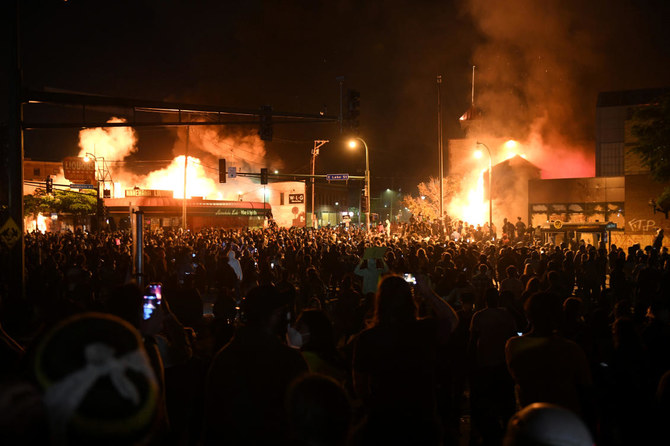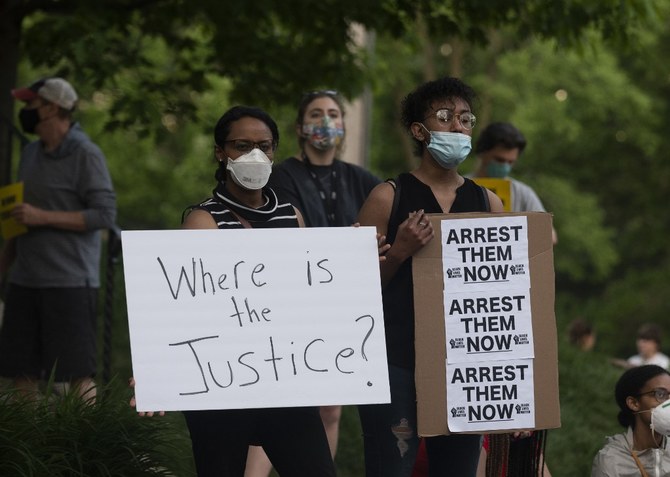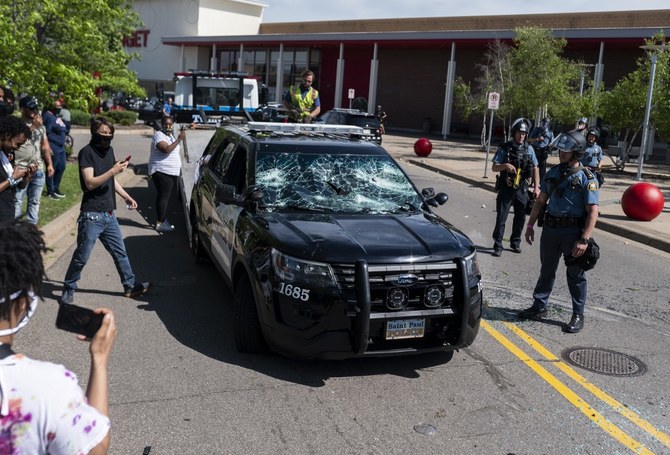MINNEAPOLIS: Cheering protesters torched a Minneapolis police station Thursday that the department was forced to abandon as three days of violent protests spread to nearby St. Paul and angry demonstrations flared across the US over the death of George Floyd, a handcuffed black man who pleaded for air as a white police officer kneeled on his neck.
A police spokesman confirmed late Thursday that staff had evacuated the 3rd Precinct station, the focus of many of the protests, “in the interest of the safety of our personnel” shortly after 10 p.m. Livestream video showed the protesters entering the building, where fire alarms blared and sprinklers ran as blazes were set.
Protesters could be seen setting fire to a Minneapolis Police Department jacket.
Late Thursday, President Donald Trump blasted the “total lack of leadership” in Minneapolis. “Just spoke to Governor Tim Walz and told him that the Military is with him all the way. Any difficulty and we will assume control but, when the looting starts, the shooting starts,” he said on Twitter.
A visibly tired and frustrated Frey made his first public appearance of the night at City Hall near 2 a.m. and took responsibility for evacuating the precinct, saying it had become too dangerous for officers there. As Frey continued, a reporter cut across loudly with a question: “What’s the plan here?”
“With regard to?” Frey responded. Then he added: “There is a lot of pain and anger right now in our city. I understand that ... What we have seen over the past several hours and past couple of nights here in terms of looting is unacceptable.”
He defended the city’s lack of engagement with looters — only a handful of arrests across the first two nights of violence — and said, “We are doing absolutely everything that we can to keep the peace.” He said Guard members were being stationed in locations to help stem looting, including banks, grocery stores and pharmacies.
Protests first erupted Tuesday, a day after Floyd’s death in a confrontation with police captured on widely seen citizen video. On the video, Floyd can be seen pleading as Officer Derek Chauvin presses his knee against him. As minutes pass, Floyd slowly stops talking and moving. The 3rd Precinct covers the portion of south Minneapolis where Floyd was arrested.
Minnesota Gov. Tim Walz earlier Thursday activated the National Guard at the Minneapolis mayor’s request, but it wasn’t immediately clear when and where the Guard was being deployed, and none could be seen during protests in Minneapolis or St. Paul. The Guard tweeted minutes after the precinct burned that it had activated more than 500 soldiers across the metro area.
The Guard said a “key objective” was to make sure fire departments could respond to calls, and said in a follow-up tweet it was “here with the Minneapolis Fire Department” to assist. But no move was made to put out the 3rd Precinct fire. Assistant Fire Chief Bryan Tyner said fire crews could not safely respond to fires at the precinct station and some surrounding buildings.
Earlier Thursday, dozens of businesses across the Twin Cities boarded up their windows and doors in an effort to prevent looting, with Minneapolis-based Target announcing it was temporarily closing two dozen area stores. Minneapolis shut down nearly its entire light-rail system and all bus service through Sunday out of safety concerns.
Minneapolis police station torched amid George Floyd protest
https://arab.news/2jcmu
Minneapolis police station torched amid George Floyd protest

- George Floyd pleaded for air as a white police officer kneeled on his neck
- Protests first erupted Tuesday a day after Floyd’s death
Russia launches smallest nighttime attack on Ukraine in months in run-up to possible peace talks
The Kremlin hasn’t directly responded to Ukrainian President Volodymyr Zelenskyy’s challenge for Russian leader Vladimir Putin to meet him in person at the negotiations in Istanbul on Thursday.
Kremlin spokesman Dmitry Peskov refused for the second straight day Tuesday to tell reporters whether Putin will travel to Istanbul and who else will represent Russia at the potential talks. “As soon as the president considers it necessary, we will make an announcement,” Peskov said.
Russia has said it will send a delegation to Istanbul without preconditions.
The U.S. has been applying stiff pressure on both sides to come to the table since President Donald Trump came to power in January with a promise to end the war.
Military analysts say both sides are preparing a spring-summer campaign on the battlefield, where a war of attrition has killed tens of thousands of soldiers on both sides along the roughly 1,000-kilometer (620-mile) front line. The Institute for the Study of War, a Washington think tank, said Monday that Russia is “quickly replenishing front-line units with new recruits to maintain the battlefield initiative.”
Zelenskyy will not be meeting with any Russian officials in Istanbul other than Putin, Mykhailo Podolyak, an adviser to Zelenskyy, said Tuesday on a YouTube show run by prominent Russian journalists in exile.
Lower-level talks would amount to simply “dragging out” any peace process, Podolyak said. European leaders have recently accused Putin of dragging his feet in peace efforts while he attempts to press his bigger army’s battlefield initiative and capture more Ukrainian land.
Russia effectively rejected an unconditional 30-day ceasefire demanded by Ukraine and Western European leaders from Monday, when it fired more than 100 drones at Ukraine. Putin instead offered direct peace talks with Ukraine in Istanbul on Thursday.
Russia shunned the ceasefire proposal tabled by the U.S. and European leaders but offered direct talks with Ukraine.
Putin has repeatedly questioned the legitimacy of the Ukrainian government, especially Zelenskyy himself, saying his term expired last year. Under Ukraine’s constitution, it is illegal for the country to hold national elections while it’s under martial law, as it now is.
In a further complication, a Ukrainian decree from 2022 rules out negotiations with Putin.
U.S. Secretary of State Marco Rubio spoke Monday with the top diplomats from the United Kingdom, France, Germany and Poland, who were meeting in London, to assess “the way forward for a ceasefire and path to peace in Ukraine,” spokesperson Tammy Bruce said.
Those European countries had pledged further sanctions on Russia if it didn’t comply with a full ceasefire that Ukraine had accepted from Monday, but they made no announcement of additional punitive measures.
___
Follow AP’s coverage of the war in Ukraine at https://apnews.com/hub/russia-ukraine
Putin skipping talks would be 'final signal' Moscow unwilling to end war

KYIV: Ukraine on Tuesday said that if Russian President Vladimir Putin skips talks in Turkey on Thursday with Volodymyr Zelensky, it would be a clear sign that Moscow does not have any intentions of halting its invasion.
Zelensky has called on Putin to personally attend direct Russia-Ukraine talks that the Kremlin leader himself suggested, but Moscow on Tuesday declined to respond to that invitation for the second day running.
"If Vladimir Putin refuses to come to Turkey, it will be the final signal that Russia does not want to end this war, that Russia is not willing and not ready for any negotiations," Zelensky's chief of staff, Andriy Yermak, said in a statement published by the Ukrainian presidency.
Putin's spokesman on Tuesday refused to say who Russia would send to Istanbul.
"The Russian side continues to prepare for the talks scheduled for Thursday. That is all we can say at this point. We do not intend to comment further at this time," spokesman Dmitry Peskov told reporters.
Asked if he could name Russia's negotiating team, Peskov said: "No... as soon as the president deems it necessary, we will announce it."
The meeting between Russian and Ukrainian negotiators in Turkey would be the first direct talks on the invasion between the two sides since the first months of the war.
Putin proposed negotiations in a late-night statement from the Kremlin over the weekend, a counteroffer after Kyiv and Europe urged Moscow to agree to a full and unconditional 30-day ceasefire starting Monday.
India kills three suspected militants in Kashmir as Pakistan ceasefire holds

- Clash happened after army’s received information that militants were in Keller forest in the southern Kashmir valley
- Site is around 65 kilometers from Pahalgam, where militants last month killed 26 people, mostly Hindu tourists
NEW DELHI: Three suspected rebels were killed in Indian-administered Kashmir on Tuesday in a gunbattle with soldiers, the army said, the first since an attack on tourists last month brought India and Pakistan to the brink of war.
The clash happened after the army’s special counter-insurgency force received information that militants were in Keller forest in the southern Kashmir valley, the army said.
The site is around 65 kilometers (40 miles) from Pahalgam, where militants last month killed 26 people, mostly male Hindu tourists, sparking the worst fighting between India and Pakistan since 1999.
A “search and destroy Operation” was launched leading to a clash, the Indian army said on X.
“During the operation, terrorists opened heavy fire and fierce firefight ensued, which resulted in elimination of three hardcore terrorists,” it said.
India accused Pakistan of backing the “terrorists” it said were responsible for the Pahalgam attack — a charge Islamabad denied — and last week launched missiles at sites in Pakistan it said were hosting the militants.
Four days of tit-for-tat jet fighter, drone, missile and artillery attacks followed, until they agreed to a ceasefire Saturday that US President Donald Trump said was brokered by Washington.
On Tuesday Pakistan’s army announced a new death toll from the fighting, saying that India’s “unprovoked and reprehensible dastardly attacks” killed 40 civilians, including seven women and 15 children, and 11 military service members.
“While defending the motherland with exemplary valour, 11 personnel of the Pakistan Armed Forces embraced martyrdom and 78 were wounded.”
Previously Pakistan’s official toll was 33 civilians with no military losses.
India has said that 15 civilians and five soldiers died.
Despite mutual claims on initial violations, the ceasefire still appeared to be holding on Tuesday.
Trump said Monday that US intervention had prevented a “bad nuclear war.”
“We stopped a nuclear conflict... millions of people could have been killed. So I’m very proud of that,” he told reporters at the White House.
Indian Prime Minister Narendra Modi said in a televised address to the nation on Monday that Pakistan has chosen to attack rather than help it fight “terrorism.”
“If another terrorist attack against India is carried out, a strong response will be given,” he said.
A post from his account on X Tuesday said he had met with service members involved in the conflict.
“It was a very special experience to be with those who epitomize courage, determination and fearlessness. India is eternally grateful to our armed forces for everything they do for our nation,” he said.
The flare-up in violence was the worst since the rivals’ last open conflict in 1999 and sparked global shudders that it could spiral into full-blown war.
Pakistan’s military statement Tuesday listed the highest ranked service member to be killed in the latest conflict as an air force squadron leader.
The military has said it downed five Indian jets but has not admitted losing any aircraft of its own.
India has not disclosed losing any aircraft.
Militants have stepped up operations in Kashmir since 2019, when Modi’s Hindu nationalist government revoked the region’s limited autonomy and took it under direct rule from New Delhi.
Divided Muslim-majority Kashmir is claimed in full by both countries, who have fought several wars over the territory since their independence from Britain in 1947.
UK High Court hears legal challenge over British government's role in arming Israel

LONDON: In a High Court hearing starting Tuesday, the UK government will defend its decision to continue supplying parts for F-35 fighter jets that may be used by Israel in Gaza.
The legal challenge was brought by human rights groups, which argue that the government is breaking domestic and international law and is complicit in atrocities against Palestinians by allowing essential components for the warplanes to be supplied to Israel.
The government said in September that it was suspending about 30 of 350 existing export licenses for equipment deemed to be for use in the conflict in Gaza because of a “clear risk” that the items could be used to “commit or facilitate a serious violation of international humanitarian law.” Those equipment included parts for helicopters and drones.
But an exemption was made for some licenses related to components of F-35 fighter jets, which have been linked to Israel’s bombardment campaign in the Gaza Strip. Rights groups argue that the United Kingdom shouldn't continue the export of the parts through what they call a “deliberate loophole” given the government's own assessment of Israel’s compliance with international humanitarian law.
Palestinian human rights organization Al-Haq and the UK-based Global Legal Action Network, which brought the legal challenge, say the components are indirectly supplied to Israel through the global spare parts supply chain.
UK officials have argued that stopping the export of F-35 fighter jet components would negatively impact international peace and security.
Compared to major arms suppliers such as the U.S. and Germany, British firms sell a relatively small amount of weapons and components to Israel.
The Campaign Against Arms Trade nonprofit group estimates that the UK supplies about 15% of the components in the F-35 stealth combat aircraft, including its laser targeting system.
“British-made F-35s are dropping multi-ton bombs on the people of Gaza, which the UN secretary-general has described as a ‘killing field,’” said Charlotte Andrews-Briscoe, a lawyer for the Global Legal Action Network.
“The UK government has expressly departed from its own domestic law in order to keep arming Israel. This decision is of continuing and catastrophic effect," she added.
The hearing is expected to last four days and a decision is expected at a later date.
Israel resumed its bombardment in Gaza in March, shattering a two-month ceasefire with Hamas. More than 52,800 people, more than half of them women and children, have been killed in Gaza, according to the territory's health ministry. The ministry’s count doesn't differentiate between civilians and combatants. Israel says it has killed thousands of militants, without giving evidence.
In November, the International Criminal Court issued arrest warrants for Israeli Prime Minister Benjamin Netanyahu and Hamas’ military chief, accusing them of crimes against humanity in connection with the war in Gaza.
Police raid conspiracy theorist group 'Kingdom of Germany'

BERLIN: German authorities on Tuesday banned an extremist group called the "Kingdom of Germany", raided multiple locations nationwide and arrested four of its leading members.
The group is part of a right-wing conspiracy theorist movement known as the "Citizens of the Reich" ("Reichsbuerger"), which rejects the legitimacy of the modern German republic.
Among those detained was the group's self-proclaimed "king" Peter Fitzek, 59, a former chef and karate instructor.
He founded the organisation, which has claimed to have about 6,000 members.
Long dismissed as malcontents and oddballs, the Reichsbuerger have become increasingly radicalised and are considered a security threat by German authorities.
Hundreds of security forces searched properties in seven states linked to the group, known in German as "Koenigreich Deutschland".
The interior ministry said that over the past 10 years, the group had established "pseudo-state structures and institutions", issuing its own currency and identity papers and running an insurance scheme for its members.
The ministry declared the dissolution of the group, which it accused of "attacking the liberal democratic order" of the federal Republic of Germany.
Interior Minister Alexander Dobrindt said that the members of the group had "created a 'counter-state' in our country and built up economic criminal structures".
"In this way, they persistently undermine the legal system and the Federal Republic's monopoly on the use of force."
Authorities said the association had financed itself primarily through prohibited banking and insurance transactions for its members as well as donations.
The Federal Prosecutor's Office in Karlsruhe said Fitzek was arrested along with three other suspected ringleaders of the group, which was classified as a criminal organisation.
As the "so-called supreme sovereign," Fitzek had "control and decision-making power in all key areas", the Prosecutor's Office said.
"The Kingdom of Germany considers itself a sovereign state within the meaning of international law and strives to extend its claimed 'national territory' to the borders of the German Empire of 1871," it added in a statement.
Fitzek, who once ran unsuccessfully to enter parliament, anointed himself as "king" in 2012 in an elaborate ceremony complete with a crown and sceptre.
He told AFP in an interview in 2023 that founding the organisation was the only answer to the "mass manipulation" he saw in German society.
His followers tend to be people with a "pioneering spirit" who "want to make a positive change in this world", Fitzek told AFP in Wittenberg, the group's original base in eastern Germany.
In Tuesday's raids, police searched locations in the states of Baden-Wuerttemberg, Lower Saxony, North Rhine-Westphalia, Rhineland-Palatinate, Saxony, Saxony-Anhalt and Thuringia.
There were around 23,000 members of the Reichsbuerger movement in 2022, according to Germany's domestic intelligence agency.
More than 2,000 of them were considered potentially violent.
While Reichsbuerger members subscribe to an ideology similar to that of the Kingdom of Germany, the Reichsbuerger movement is made up of many disparate groups.
In 2022, members of a group including an ex-MP and former soldiers were arrested over a plot to attack parliament, overthrow the government and install aristocrat and businessman Prince Heinrich XIII Reuss as head of state.
Another high-profile case saw a group of Reichsbuerger members charged with plotting to kidnap the then health minister, Karl Lauterbach, in protest at Covid-19 restrictions.
























